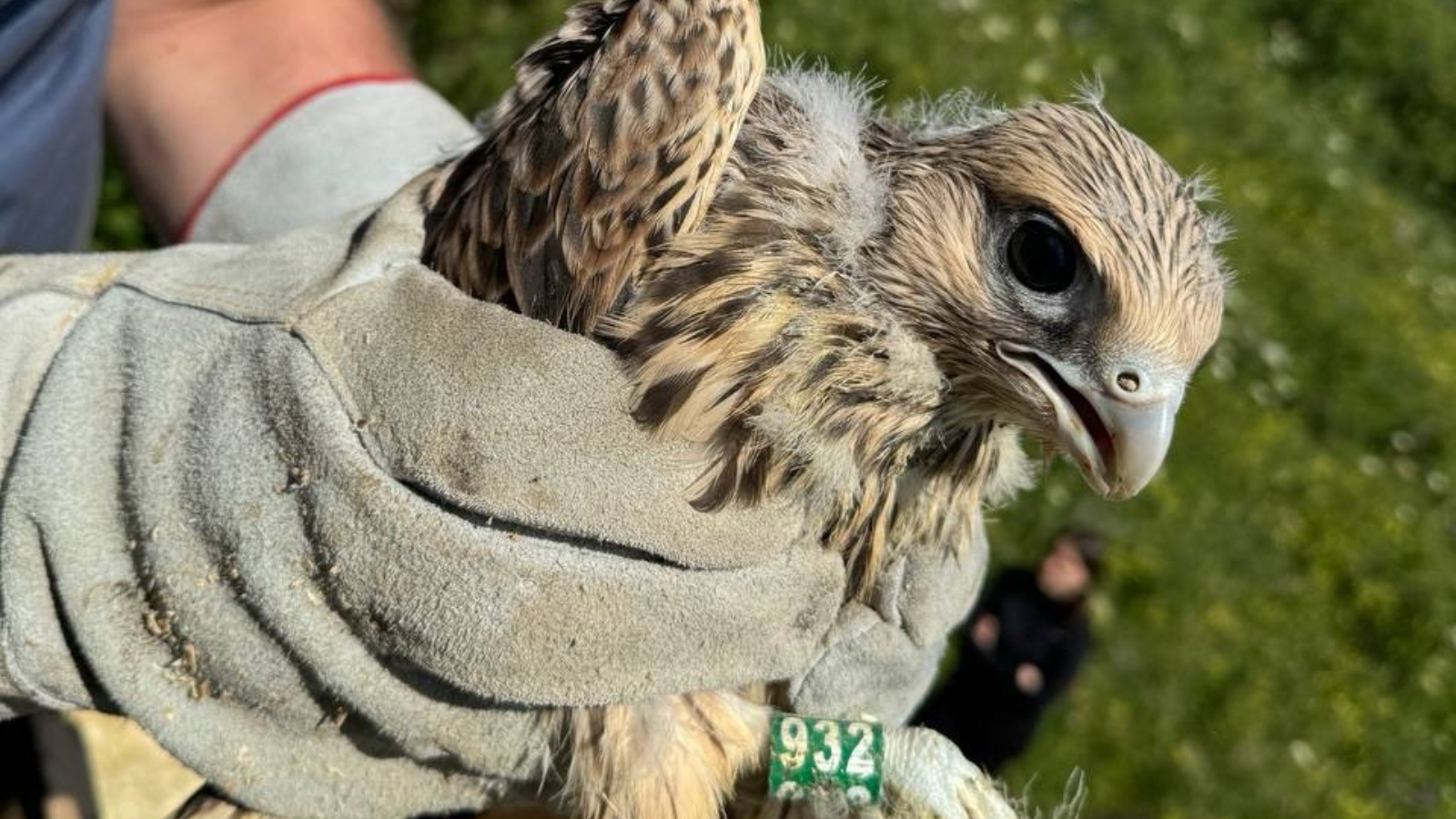10 more saker falcon chicks have been delivered to Tatarstan. The project of the Ministry of Ecology of Tatarstan on the revival of the Red Book bird continues

In support of the national project "Ecology", the project of the Ministry of Ecology of Tatarstan on the revival of the Volga-Kama Saker falcon population continues.
In June 2023, 10 saker falcon chicks were delivered to the Kamsko-Ustinsky district of the republic, where they were under the protection and care of volunteers and ornithologists, and later released into the wild.
The project continues in 2024. The main stages of the project were the delivery of 10 chicks from the Peregrine Falcon nursery (Moscow region), the establishment of a volunteer camp, and the organization of video monitoring in the hake for remote monitoring.
"This year we are continuing our project to revive the population of Saker falcons on the same land in the Kamsko-Ustinsky district. Our little chicks have already arrived here, who will be taken care of by KFU volunteers for a long time," said Olga Manidicheva, Deputy Minister of Ecology, as part of a press tour for journalists.
The project continues with the support of the SIBUR grant system, as well as thanks to the high assessment from the Ministry of Natural Resources of Russia.
"We are supported by the Ministry of Natural Resources of the Russian Federation, which is also doing a lot in our country today to revive the Red Book species of plants and animals. This is a comprehensive project, science, business, our volunteers, and local governments are here. This is the synergy that allows us to develop, move on, look to the future and talk about new projects," the Deputy Minister of Ecology of Tatarstan told reporters.
She added that after the release of the birds last year, two of them were found outside the Russian Federation - one in Saudi Arabia, the second in Pakistan. This year, one of the tasks of the volunteers is to record and mark the return to Tatarstan of birds released in 2023.
"The national Ecology project ensures the conservation of biological diversity throughout our country. Reserves, national parks, and wildlife sanctuaries are being created for this purpose. Special attention within the framework of the national project is paid to rare endangered species of birds, animals, and plants. We are considering the inclusion of the saker falcon in one of the projects in order for the conservation and maintenance of these birds to receive federal support and funding, among other things. We could develop a separate concept for the conservation of this species and pay more attention to monitoring, since this historical species used to be in Russia and we would like to restore its population," said Alexey Tikhnenko, Deputy Director of the Department of State Policy and Regulation in the Field of Protected Areas Development.
"We are always happy to support the projects of the Republic of Tatarstan. This is the second year that we have been participating in the implementation of a project on the conservation of biological diversity in Tatarstan. Last year, we supported a project to revive the saker falcon population, 10 chicks were released. This year we are repeating this story and also 10 chicks will be released into the wild. We are always ready to support projects that have a positive effect on the environment," said Alexander Zhalyuk, Chief Ecologist of PJSC Kazanorgsintez.
The Regional Public Foundation named after A. I. Shchepovskikh, the Regional Public Fund for the Protection of Rare Birds "Sapsan", Kazan (Volga Region) Federal University, ornithologists and a new partner of the project – Kazan Zoo are also taking part in the project.
The novelty of this year was that the specialists of the Kazan Zoo are involved in the release of birds, monitor their condition, and 4 adult birds are housed in the aviaries of the Kazan Zoo for the formation of pairs and breeding of chicks in the Republic of Tatarstan.
"We are participating in this project because one of the main tasks of the zoo is to preserve biodiversity and reintroduction of rare species. At the moment, we have taken 4 saker falcon chicks, we hope they will take root with us. Now they have already adapted and are eating. We hope that in the future we will receive offspring, which we will also release into the natural environment. You can get five to ten falcon chicks," said Alexander Malev, Deputy director of the Kazan Zoo.
Let us recall that the project of reintroduction of the Saker falcon of the Ministry of Ecology of the Republic of Tatarstan became the winner of the All-Russian competition "Reliable Partner – Ecology", as well as a finalist of the Crystal Compass award
For reference: The Saker Falcon is a rare bird species that is listed in the Red Books of the International Union for Conservation of Nature, the Russian Federation and the Republic of Tatarstan. The Ministry of Ecology of Tatarstan, with the scientific support of the scientific community with the involvement of volunteers and thanks to the grant support of the SIBUR competition "Formula of Good Deeds", in 2023 began the implementation of a pilot project to revive the Volga-Kama Saker falcon population, the last nesting of which was recorded in 1974 on the territory of the Saralinsky section of the Volga-Kama Reserve.